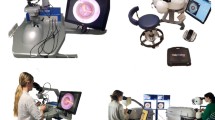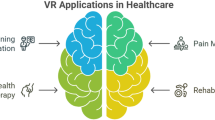Abstract
Purpose
Training within a proficiency-based virtual reality (VR) curriculum may reduce errors during real surgical procedures. This study used a scientific methodology to develop a VR training curriculum for phacoemulsification surgery (PS).
Patients and methods
Ten novice-(n) (performed <10 cataract operations), 10 intermediate-(i) (50–200), and 10 experienced-(e) (>500) surgeons were recruited. Construct validity was defined as the ability to differentiate between the three levels of experience, based on the simulator-derived metrics for two abstract modules (four tasks) and three procedural modules (five tasks) on a high-fidelity VR simulator. Proficiency measures were based on the performance of experienced surgeons.
Results
Abstract modules demonstrated a ‘ceiling effect’ with construct validity established between groups (n) and (i) but not between groups (i) and (e)—Forceps 1 (46, 87, and 95; P<0.001). Increasing difficulty of task showed significantly reduced performance in (n) but minimal difference for (i) and (e)—Anti-tremor 4 (0, 51, and 59; P<0.001), Forceps 4 (11, 73, and 94; P<0.001). Procedural modules were found to be construct valid between groups (n) and (i) and between groups (i) and (e)—Lens-cracking (0, 22, and 51; P<0.05) and Phaco-quadrants (16, 53, and 87; P<0.05). This was also the case with Capsulorhexis (0, 19, and 63; P<0.05) with the performance decreasing in the (n) and (i) group but improving in the (e) group (0, 55, and 73; P<0.05) and (0, 48, and 76; P<0.05) as task difficulty increased.
Conclusion
Experienced/intermediate benchmark skill levels are defined allowing the development of a proficiency-based VR training curriculum for PS for novices using a structured scientific methodology.
Similar content being viewed by others
Log in or create a free account to read this content
Gain free access to this article, as well as selected content from this journal and more on nature.com
or
References
Aggarwal R, Darzi A . Technical-skills training in the 21st century. N Engl J Med 2006; 355: 2695–2696.
Spiteri A, Aggarwal R, Kersey T, Benjamin L, Darzi A, Bloom P . Phacoemulsification skills training and assessment. Br J Ophthalmol 2010; 94: 536–541.
Spitz L, Kiely EM, Piero A et al. Decline in surgical training. Lancet 2002; 359: 83.
Smith JH . Teaching phacoemulsification in US ophthalmology residencies: can the quality be maintained? Curr Opin Ophthalmol 2005; 16: 27–32.
Aggarwal R, Ward J, Balasundaram I, Sains P, Athanasiou T, Darzi A . Proving the effectiveness of virtual reality simulation for training in laparoscopic surgery. Ann Surg 2007; 246: 771–779.
Aggarwal R, Tully A, Grantcharov T, Larsen CR, Miskry T, Farthing A et al. Virtual reality simulation training can improve technical skills during laparoscopic salpingectomy for ectopic pregnancy. BJOG 2006; 113: 1382–1387.
Colg HG, Crawford SW, Galbraith O 3rd . Virtual reality bronchoscopy simulation: a revolution in procedural training. Chest 2001; 120: 1333–1339.
Aggarwal R, Black SA, Hance JR, Darzi A, Cheshire NJ . Virtual reality simulation training can improve inexperienced surgeons’ endovascular skills. Eur J Vasc Endovasc Surg 2005; 31 (6): 588–593.
Anastakis DJ, Wanzel KR, Brown MH, McIlroy JH, Hamstra SJ, Ali J et al. Evaluating the effectiveness of a 2-year curriculum in a surgical skills center. Am J Surg 2003; 185: 378–385.
Aggarwal R, Grantcharov TP, Darzi A . Framework for systematic training and assessment of technical skills. J Am Coll Surg 2007; 204: 697–705.
Solverson DJ, Mazzoli RA, Raymond WR, Nelson ML, Hansen EA, Torres MF et al. Virtual reality simulation in acquiring and differentiating basic ophthalmic microsurgical skills. Simul Healthc 2009; 4 (2): 98–103.
Feudner EM, Engel C, Neuhann IM, Petermeier K, Bartz-Schmidt KU, Szurman P . Virtual reality training improves wet-lab performance of capsulorhexis: results of a randomized, controlled study. Graefes Arch Clin Exp Ophthalmol 2009; 247 (7): 955–963.
Aggarwal R, Grantcharov TP, Eriksen JR, Blirup D, Kristiansen VB, Funch-Jensen P et al. An evidence-based virtual reality training program for novice laparoscopic surgeons. Ann Surg 2006; 244: 310–314.
Aggarwal R, Grantcharov T, Moorthy K, Hance J, Darzi A . A competency-based virtual reality training curriculum for the acquisition of laparoscopic psychomotor skill. Am J Surg 2006; 191: 128–133.
Mackay S, Morgan P, Datta V, Chang A, Darzi A . Practice. Distribution in procedural skills training: a randomized controlled trial. Surg Endosc 2002; 16: 957–961.
Moulton CA, Dubrowski A, Macrae H, Graham B, Grober E, Reznick R . Teaching surgical skills: what kind of practice makes perfect? a randomized, controlled trial. Ann Surg 2006; 244: 400–409.
Mahr MA, Hodge DO . Construct validity of anterior segment anti-tremor and forceps surgical simulator training modules: attending versus resident surgeon performance. J Cataract Refract Surg 2008; 34 (6): 980–985.
Le TD, Adatia FA, Lam WC . Virtual reality ophthalmic surgical simulation as a feasible training and assessment tool: results of a multicentre study. Can J Ophthalmol 2011; 46 (1): 56–60.
Privett B, Greenlee E, Rogers G, Oetting TA . Construct validity of a surgical simulator as a valid model for capsulorhexis training. J Cataract Refract Surg 2010; 36 (11): 1835–1838.
MacRae HM, Satterthwaite L, Reznick RK . Setting up a surgical skills center. World J Surg 2008; 32: 189–195.
Acknowledgements
Emily Turton MSc (Research Assistant) for contributing towards statistical analysis. All running expenses funded privately.
This study has been previously presented at: The European Society of Cataract and Refractive Surgery (ESCRS) Annual Congress, Vienna, Austria on the 20th September 2011 where it was Winner of one of the Best of the Best at the Special Free Paper Session. The United Kingdom and Ireland Society of Cataract and Refractive Surgery (UKISCRS) Annual Congress, Southport, England, 14 October 2011* where it was voted Winner of the Best Cataract Surgery Paper. The study is being piloted at Regional Deanery level with a view to being implemented nationwide by the Royal College of Ophthalmologists as part of the training curriculum for all novice ophthalmic surgeons in the United Kingdom.
Author information
Authors and Affiliations
Corresponding author
Ethics declarations
Competing interests
The authors declare no conflict of interest.
Rights and permissions
About this article
Cite this article
Spiteri, A., Aggarwal, R., Kersey, T. et al. Development of a virtual reality training curriculum for phacoemulsification surgery. Eye 28, 78–84 (2014). https://doi.org/10.1038/eye.2013.211
Received:
Accepted:
Published:
Issue date:
DOI: https://doi.org/10.1038/eye.2013.211
Keywords
This article is cited by
-
Confidence of UK Ophthalmology Registrars in Managing Posterior Capsular Rupture: Results from a National Trainee Survey
Ophthalmology and Therapy (2022)
-
The potential impact of 5G telecommunication technology on ophthalmology
Eye (2021)
-
A systematic review of simulation-based training tools for technical and non-technical skills in ophthalmology
Eye (2020)
-
Simulators in the training of surgeons: is it worth the investment in money and time? 2018 Jules Gonin lecture of the Retina Research Foundation
Graefe's Archive for Clinical and Experimental Ophthalmology (2019)
-
Intraoperative head drift and eye movement: two under addressed challenges during cataract surgery
Eye (2018)



